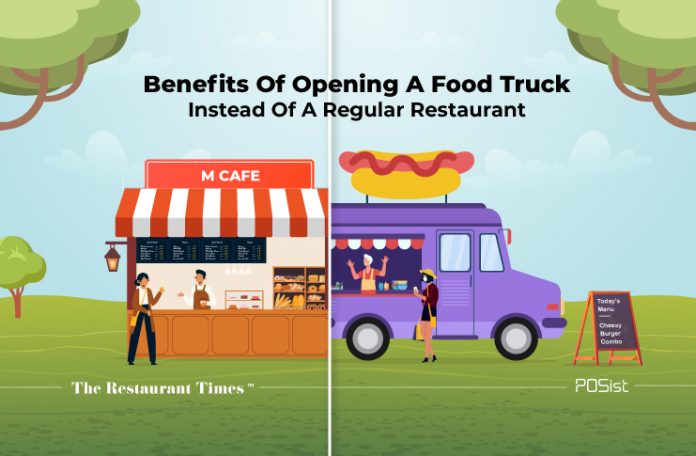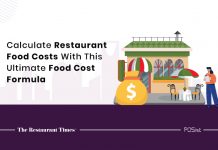With a rise in average consumer expenditure, conscious consumerism, and an increasingly mobile lifestyle, the food truck model has become quite a rage in the Middle East. With a projected revenue growth rate of 3.7% in the next five years, the future of the food truck industry seems bright. With low investments and minimal risks involved, the food truck business is becoming one of the most popular choices for entrepreneurs. This article covers five reasons why food entrepreneurs in Saudi Arabia should open a food truck business instead of traditional restaurants.
Benefits Of Running A Food Truck Over A Traditional Restaurant In Saudi Arabia
While opinion is divided regarding which is the better restaurant format between a food cart or a food truck, we would explain why opening a food truck instead of a regular restaurant in Saudi Arabia is a better option.
1. Food Trucks Require Low Initial Investment
A food truck is considered a high-profit food business idea, mainly because it involves a much lower investment than a sit-down restaurant. This, in itself, is a competitive advantage in favor of opening a food truck as the capital thus saved can be utilized for other operations such as marketing or menu engineering. The only significant cost is buying your truck, which is also avoidable if you leverage the growing food truck rental business.
Another major investment in the food truck business is procuring the right equipment, which includes conventional equipment such as exhausts, grillers, heat lamps, or any other specialty equipment, according to the cuisine.
2. Food Truck Involves Relatively Low Operation Cost
Owning a traditional restaurant requires operators to invest in expensive utilities and hire a wide range of staff, including chefs, cashiers, servers, kitchen managers, etc. Moreover, traditional restaurant owners have to pay hefty property tax or monthly rentals, if the property is on rent. Hence, it becomes imperative for physical restaurant owners to keep a check on the cost of the operations, and the hidden costs that may be bleeding the restaurant dry.
On the other hand, the operational costs in a food truck business are variable and limited mainly to food, supplies, and gas. One doesn’t require a full staff, and most of the taxes are much lower. Repairs and fixtures in a restaurant business can also burn a hole in your pocket. A brick and mortar property requires continuous maintenance. Maintaining utilities such as furniture, electrical appliances, other kitchen equipment, restaurant decor, etc. also requires a lot of effort and money. On the other hand, food trucks can do well with just a little maintenance and repairs here and there over time.
3. Food Trucks Attract More Customers
With quality food at a marginally lesser price than traditional restaurants, food trucks have become the latest fad among consumers. Almost all food trucks are pocket-friendly and offer a safer and healthier alternative to dine-in meals. With growing health consciousness, food trucks are also investing in proper packaging and safety measures while preparing the food.
4. Food Trucks Can Experiment with Location
Going by the statistics, around 60 percent of new restaurants fail within the first year, and nearly 80 percent shut before their fifth year of operation, poor location, and high rentals being one of the primary reasons.
Food trucks are fortunately immune to this problem as they are mobile, and one can easily change their location if the present area gets too saturated. However, before you move the vehicle to some other location, analyze if there is enough scope for it to thrive there.
The mobility feature of food trucks can be leveraged to attract potential customers as well. With a food truck, it will be easier for you to take part in different cultural or social events and food fests so you can introduce your dishes to new audiences. You can also strategically change your location on a daily or weekly basis, depending on the rise and fall of footfall in some areas. However, you must remember to choose a location that is easily accessible and sees ample footfall.
5. Food Trucks Allow You to Build/ Establish A Brand
With a mobile food van or truck, you can establish your brand at a smaller level before expanding into a sit-down restaurant or franchising the trucks. The dynamics of a food truck are entirely different from those of a sit-down restaurant.
Analyzing the best location, modifying plans, trying new recipes, and menus is much easier with a food truck model when compared to a traditional restaurant. As sit-down restaurants are of a fixed nature, it is extremely difficult and expensive to change the brand name and image.
A food truck enables better control and more flexibility. This is undoubtedly the best avenue for first-time entrepreneurs to research and experiment with their model before venturing into establishing a sit-down restaurant with high investments and risks. After gaining comprehensive knowledge about the food truck business, you can either go for your food truck business expansion or evolve the model into a traditional restaurant format.
The future of the food truck business seems to move high on the profit graph in Saudi Arabia. If revenue continues to grow as estimated, there is tremendous scope for entrepreneurs who already are, or wish to, step into the food truck business.


















